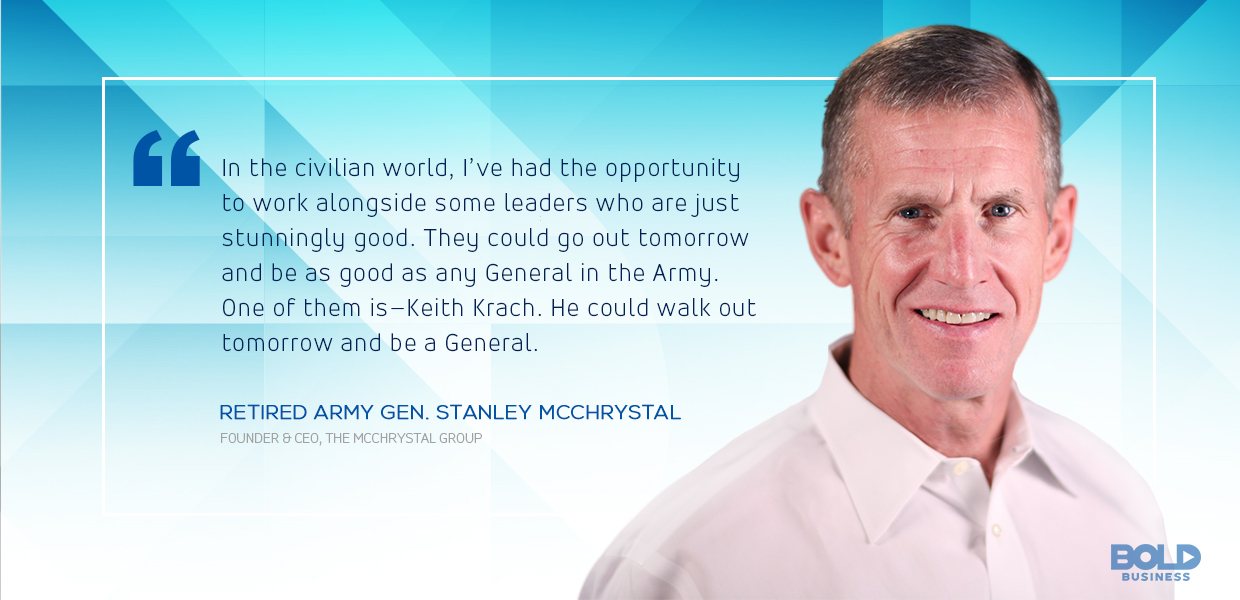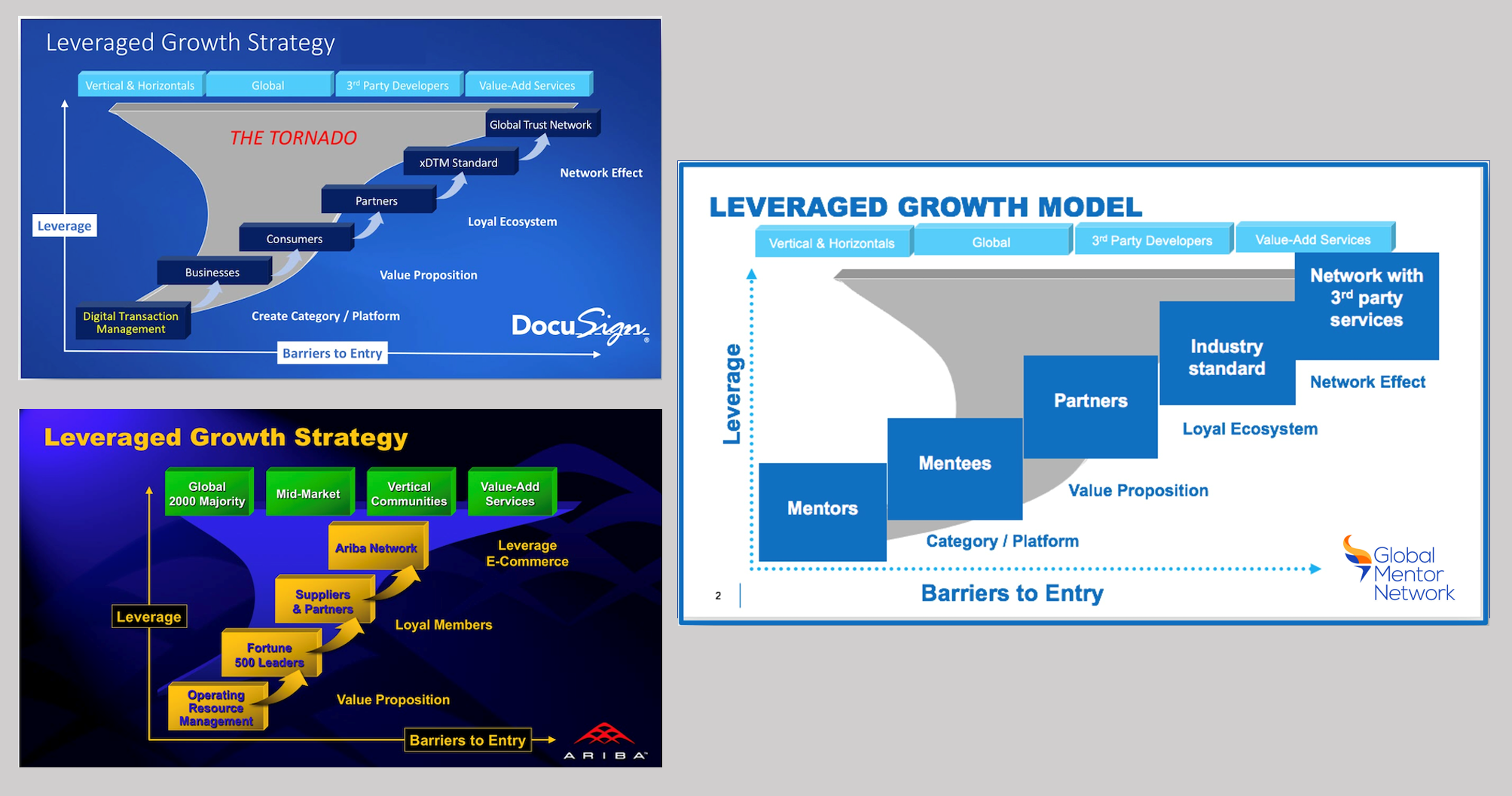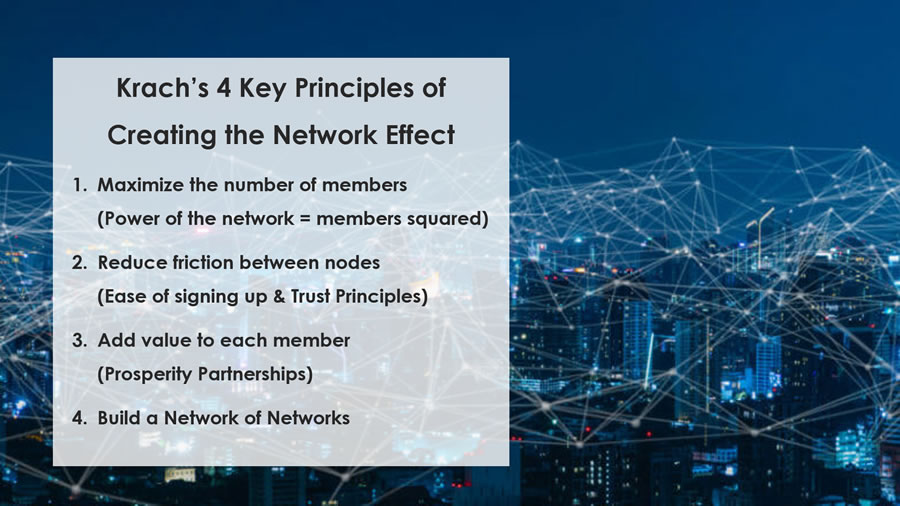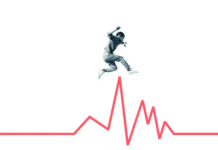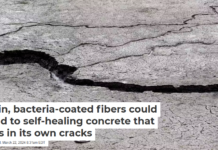
The Clean Network’s Momentum and Secret Sauce
A three article series containing seven parts on The Clean Network
First << Previous << The Clean Network’s Momentum and Secret Sauce
by Michael Mink
Part VI
The Clean Network’s Rolling Thunder
Leadership is defined by Momentum
- April 29, 2020, Secretary Pompeo announced that, as part of the 2019 National Defense Authorization Act, the State Department will require a “Clean Path” for all standalone 5G network traffic entering and exiting U.S. diplomatic facilities at home and abroad.
- May 18, 2020, the 5G Trifecta announced which represents the execution of the crucial onshoring of TSMC’s semiconductors, locking down on Huawei’s advanced semiconductors and the global roll out of the Clean Path stratagem three major accomplishments achieved early in the Clean Network campaign.
| The Opening Gambit – The 5G Trifecta
Washington Times headline read “U.S. scored ‘5G trifecta’ in competition with China” The execution of the crucial onshoring of TSMC’s semiconductors, the critical locking down of advanced semiconductors from Huawei and strategic rolling out the innovative Clean Path strategy put Huawei immediately on the defensive. This trifecta of accomplishments served as the launchpad for Krach’s Clean Network team and will safeguard the security of America’s technological assets for years to come. First, Krach’s team partnered with the Commerce Department to secure an historic announcement from TSMC (Taiwan Semiconductor Manufacturing Company) that it will build the world’s most advanced five-nanometer chip fabrication facility in Arizona. This not only represents the largest onshoring in American history but a quantum leap forward in securing the semiconductor supply chain and 5G security for the United States and its partners. It ensures that the chips powering everything from smartphones, to 5G base stations, to advanced artificial intelligence will be “Made in America.” The decision by one of the world’s largest manufacturers of semiconductors to build a $12 billion plant in Arizona is a “game-changer” for the U.S. high-tech industry and for national security in the competition against China, according to the Washington Times. The New York Times called a win for the Trump administration, which has called for building up U.S. manufacturing capabilities and has criticized the fragility of a tech supply chain heavily centered in China. Second, the State Department successfully launched its 5G Clean Path initiative, three weeks prior, which requires all 5G data entering or exiting facilities to transit only through trusted equipment, and never through from untrusted vendors such as Huawei and ZTE. The 5G Trifecta announcement marked the beginning of the Clean Path the roll out to other U.S. federal agencies, companies, and other nations. Many industry leading companies and countries like Japan, Albania and Taiwan have already adopted the Clean Path and Poland Prime Minister Morawiecki called on all countries and companies, especially the Europeans, to adopt a Clean Path to secure their 5G networks. It is expected that the U.S. Department of Defense will require a Clean Path for its military bases and U.S. Ambassador to NATO Kay Bailey Hutchison has called for a 5G Clean NATO Network with a Clean Path feeding into its military bases. The genius behind Krach team’s Clean Path stratagem was raising the cost for the telco operators who were contemplating Huawei 5G by creating a critical mass of network traffic from their customers that required that all sources feeding into it had to run on only trusted equipment. Third, by teaming up with the Commerce Department again Krach’s State Department team succeeded in expanding the Foreign Direct Product Rule to prevent Huawei from dodging U.S. export controls. Six months before, Senate Democratic Leader Chuck Schumer (D-NY) and Senator Tom Cotton (R-AR) sent a bipartisan letter to President Trump because they were concerned about Commerce Department saying it would issue quite a few licenses to allow U.S. firms to conduct business with Huawei. They were joined on the letter by over a dozen Senators on both sides of the aisle. This third prong of the 5G Trifecta prevents advanced technology from falling into the hands of Huawei and the Chinese Communist Party. It would block Huawei’s access to advanced semiconductors required for 5G and sophisticated smartphones. It would be so successful that Huawei was forced to sell their smartphone business used with 5G, six months later. The execution of the crucial onshoring of TSMC’s semiconductors, locking down on Huawei’s advanced semiconductors and the global roll out of the Clean Path stratagem, is why May 15, 2020 will be remembered as the day Huawei was put on the defensive. Because of the 5G Trifecta “the surveillance state” was now back peddling and the Clean Network team was playing offense and would not let go of the ball. |
- June 3, 2020, Canadian major telcos effectively lock Huawei out of 5G build. The decision of Bell and TELUS to shift to Ericsson and Nokia has left Huawei with no major carrier customers in Canada.
- June 24, 2020, Telefónica CEO and Chairman José María declares, “Telefónica is proud to be a 5G Clean Network company. Telefónica Spain and O2 (UK) are fully clean networks, and Telefónica Deutschland (Germany) and Vivo (Brazil) will be soon without equipment from any untrusted vendors.”
- June 25, 2020, Under Secretary of State Krach welcomes the Czech Republic, Norway, Poland, Estonia, Romania, Denmark, Greece, New Zealand, Japan, Australia, Israel, and Latvia as members of Clean Network.
- June 29, 2020, Huawei Loses Out in Singapore 5G Bid. Nokia and Ericsson chosen as Singapore’s 5G network providers.
- July 14, 2020, United Kingdom announces plans to ban Huawei from future 5G networks in rapid about-face. Specifically, UK mobile providers are being banned from buying new Huawei 5G equipment after December 31.
- July 15, 2020, United States hailed Britain’s decision to ban Huawei as it joins the Clean Network.
- July 22, 2020, French authorities effectively banned Huawei by telling telecoms operators planning to buy Huawei that they won’t be able to renew licenses for the gear once they expire.
- July 23, 2020, Secretary of State Pompeo urged countries to become Clean Countries so that their citizens’ personal information doesn’t end up in the hand of the Chinese Communist Party.
- August 5, 2020, Expansion of the Clean Network to include Clean Carrier, Clean Store, Clean Apps, Clean Cloud, and Clean Cable.
| Expansion of the Clean Network
The alignment around the Clean Network is about countries and companies choosing freedom versus authoritarianism. Huawei along with its CCP appendages—like cloud and apps and cables—create the Orwellian big brother state which extends the great one-way China firewall, where data comes in but not out and, reciprocally, propaganda goes out, but the truth doesn’t come in. The full set of Clean Network initiatives includes:
|
- August 6, 2020, President Trump signed two Executive Orders exercising his authority under the International Emergency Economic Powers Act (IEEPA) to address the threats posed by apps such as TikTok and WeChat.
- August 10, 2020, The Clean Network grows to 30 Clean Countries and Territories along with some of largest telecommunications companies, including Orange in France, Reliance in India, Telstra in Australia, SK and KT in Korea, Cosmote in Greece, NTT in Japan, O2 in the UK and all telcos in Canada, Norway, Vietnam, and Taiwan.
- August 24, 2020, India phases out equipment from Chinese companies from its telecom’s networks over an escalating border dispute, striking a fresh blow to the beleaguered Huawei in one of its most important markets.
Taiwan
- September 18, 2020, Krach became the highest-ranking State Department official since 1979 to visit Taiwan. He was there to represent the U.S. at the funeral of former President Lee. Krach welcomed Taiwan to the Clean Network with Taiwan President Tsai. “Taiwan is a great partner, a great friend,” Krach said. “They’re a role model for capitalism and democracy in that part of the world.”
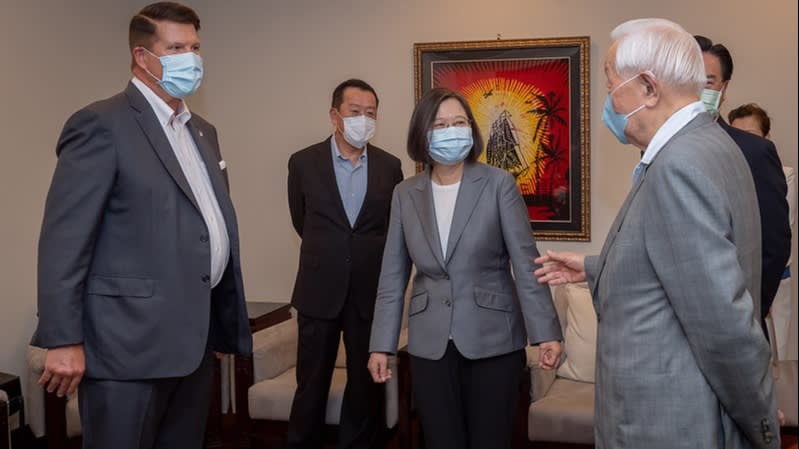
Europe
-
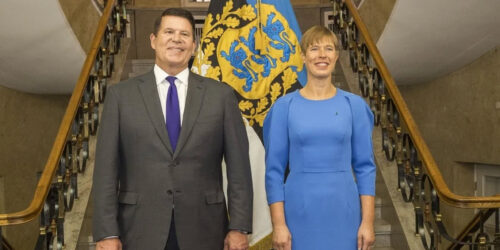
Under Secretary Krach with Estonia’s President, Kersti Kaljulaid. September 22, 2020, U.S. Under Secretary of State Keith Krach and Clean Network European Clean Network tour begins. including EU and NATO headquarters, to discuss the growing momentum toward clean 5G infrastructure and the goal of building a Transatlantic Clean Network.
-
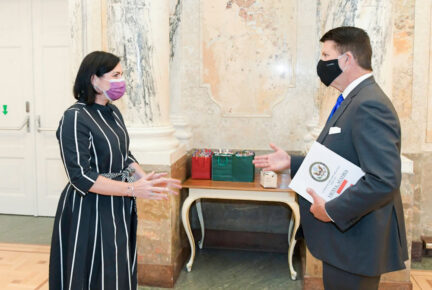
Under Secretary Krach with Austrian Federal Minister Elisabeth Köstinger September 23, 2020, Krach meets with President Kersti Kaljulaid and Foreign Minister Urmas Reinsalu of Estonia. The Estonian delegation committed to implement the EU 5G Clean Toolbox and welcomed the 5G Clean Path initiative.
- September 28, 2020, Krach and Austrian Federal Minister Elisabeth Köstinger elevate U.S.-Austria partnership to the next level in multiple areas of economic collaboration by safeguarding 5G from “high-risk” vendors through the Clean Network and the EU 5G Clean Toolbox.
- September 30, 2020 – U.S. Under Secretary of State Krach and EU Commissioner Thierry Breton issued a joint statement on the synergies between the Clean Network and the EU 5G Clean Toolbox. Toolbox meets criteria for being part of the Clean Network.
- September 30, 2020 – NATO seeks a 5G Clean NATO Network due to the strategic importance of having a non-fractured alliance. On September 30, 2020, NATO Deputy Secretary General Mircea Geoana U.S. Under Secretary of State Krach discuss the progress of the 25 NATO countries that have committed to being Clean Countries.
Securing the Transatlantic Alliance—NATO and the European Union
|
-
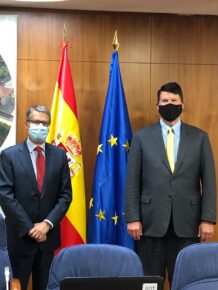
Under Secretary Krach with Spain’s Roberto Sanchez October 1, 2020, Portugal commits to implementing the EU 5G Clean Toolbox, joins Clean Network.
- October 2, 2020, Spain commits to implementing the EU 5G Clean Toolbox, joins Clean Network. Meetings with Spain’s Secretary of State for Telecommunications, Roberto Sánchez about the need to guarantee the security of those networks secured Spain’s membership in the Clean Network.
- October 3, 2020, Albania: Prime Minister Edi Rama stated, “Albania sees its role in the region not just as a constructive role in building peace and strengthening
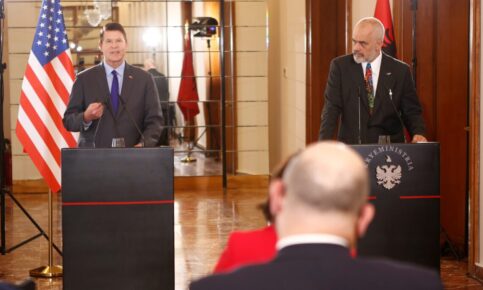
Krach and Albania Prime Minister Rama hold Clean network press conference dialogue, but as a proactive role in the 5G Clean Path.” In addition to Albania’s commitment to 5G Clean Path, Under Secretary Krach and Albania’s Finance Minister Anila Denaj signed a Memorandum of Economic Cooperation, laying the foundation on 5G security.
- October 4, 2020, Germany prepares legislation that will effectively ban the Huawei from its 5G network.
| Germany – A Huawei Turning Point
In his meetings with German executives, he encouraged them to, “learn from our mistakes in American industry.” Krach believes the U.S. gave up a staggering quantity of intellectual property to China, and fell victim to forced technology transfer, theft, deception, intimidation, and financial seduction. This is why I now tell my fellow global CEOs, “Corporate responsibility is national security.”
Progress was evident as Germany, after initial resistance, committed to implementing the EU 5G Clean Toolbox. Krach reports Germany will be issuing regulations that will result in the exclusion of Huawei in their country, which is Europe’s largest market. Krach feels the tide turned for Germany because of three factors: First, the European Union’s strong stance on implementing high-risk 5G suppliers stated in the Clean EU 5G Cybersecurity Toolbox provisions for telco operator’s boards of directors.
Second, NATO’s concerns as reflected by Deputy Secretary General Geoana: “We can’t afford to have a fractured NATO because we need the 5G civilian networks in peacetime and war. We can’t afford to have some (countries) that have trusted vendors and some that have untrusted vendors.” Third, Germany could see the momentum building around the world for the Clean Network. |
- October 8, 2020, Luxembourg and Belgium announce replacement of Huawei, join the Clean Network. The Belgian capital, Brussels, is home to the European Union’s executive body and has been 100% reliant on Chinese vendors for its radio networks. Belgium has now awarded their 5G contracts to Nokia instead of Huawei to complete their transition to a Clean Country.
- October 14, 2020 – Clean Network grows to over 40 Clean Countries, and 50 Clean Telcos.
-

Krach signing with Cyprus Minister Kyriacos Kokkinos October 17, 2020 – Clean Network adds industry leaders as Clean Companies including Oracle, HP, , NEC, Fujitsu, Cisco, NTT, Siemans and VMware.
- October 20, 2020, Cyprus joins Clean Network. Krach and Cyprus Minister for Digital Policy, Kyriacos Kokkinos, sign a memorandum of understanding regarding “Clean” technologies in Cyprus.
- October 21, 2020, Three Seas Initiative announced support for Support for the Clean Network at annual conference in Estonia. Under Secretary of State Krach said, “Countries and companies are terrified of China’s retaliation. The CCP cannot retaliate against everyone. That is where the EU comes in, the Transatlantic Alliance comes in, NATO comes in. The bottom line is the tide has turned. Countries and companies now understand that the central issue is not about technology, but trust.”
-
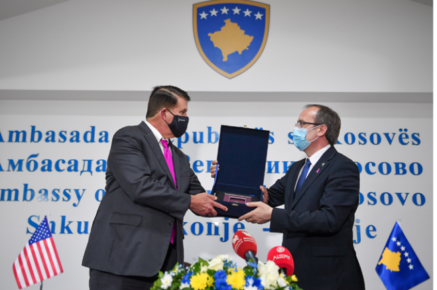
Under Secretary Krach receives gift from Kosovo Prime Minister Hoti at signing ceremony October 23, 2020, – U.S. Under Secretary of State Krach signs three Clean Network memorandums of understanding with Bulgarian Prime Minister Borisov, Kosovo Prime Minister Hoti, and North Macedonia Prime Minister Zaev
- October 23, 2020, Slovak Republic signs Joint Declaration on 5G Security, joins Clean Network.
- October 31, 2020, Clean Network grows to 49 country members, representing two-thirds of global economic output. Bloomberg says, “The success of the Clean Network has taken all the momentum away from Huawei, six months ago it looked like Huawei was unstoppable.”
- November 11, 2020, Brazil becomes 50th Country to join Clean Network. “A Clean 5G Network is not just about cell phones; it is about critical manufacturing processes, oil and gas platforms, and power networks, sanitation systems and internet of things.” – CEO of Siemens Latin America

Brazil becomes 50th country to join Clean Network
-
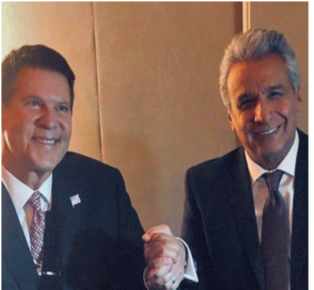
Ecuador President Moreno: “We support the principles of the Clean Network.” November 14, 2020, Ecuador joins Clean Network. “Ecuador is focusing on promoting economic growth through digital transformation. The trust guaranteed by the Clean Network could accelerate our efforts to promote economic growth while guaranteeing our national security.” – Fernando Flores, President of the Committee on National Security.
- November 17, 2020, President Luis Abinader announces Dominican Republic as a member of the Clean network and guaranteeing supply chains of secure technologies based on reliable, internationally accepted digital technology standards, through the joining of the Clean Network.

President Luis Abinader announces Dominican Republic as a member of the Clean Network - November 18, 2020, Huawei Sells Off Honor Phone Business to a state-led consortium as U.S. sanctions bite.
Part VII
The Secret Sauce Behind the Clean Network
| Transformational Leadership Key to Clean Network Success
Krach was asked in January 2019 before he was nominated as Under Secretary of State and just named The Harvard Business School 2019 Business Leader of the Year for his Transformational Leadership in Business, Technology, Education and Social Causes, how he would describe what a transformational leader is?
According to Krach, “We face big challenges today with technologies changing our world at breakneck speeds and increasingly complex world problems. Democracies are under attack from authoritarian states today than at any other time in modern history. These challenges all cry out for principled, visionary leaders who can mobilize people to dream up innovative solutions and shape the future in ways that will benefit us all.” This might make it sound like you’ve got to be doing something big to be a transformational leader, and that’s not true. We have big challenges ahead, and we need people to take them on. However, in the end, Krach believes that transformational leadership is for anyone with an honorable mission who wants to make a significant impact. Because everyone has a noble cause burning within them, it’s all about making a difference—a small difference, a big difference, but most importantly, a meaningful difference in other people’s lives.
|
| Build a High-Performance Team Organization with Best people winsA Safe Environment With all that in place, Krach believes building a safe environment, where everyone knows there’s no such thing as a bad idea (unless it’s the CEO’s) will foster the creativity, transparency and risk taking that’s needed to succeed.Crystal Clear Direction Finally, having a crystal-clear direction is essential to staying focused on working—and winning—as a team.The Playbook The real centerpiece of Krach’s leadership and management approach is building what the team’s Playbook. It might be an “e-Procurement” playbook, or a “Built to Last” playbook, or a “Mentorship at Scale” playbook, or a “Clean Network” playbook, depending on the organization and the mission, but it’s always the same general outline, with the same elements:Mission, Vision, Values, Team Rules, Goals, and Strategy, all boiled down to Execution. The image below shows Krach’s playbooks for Ariba, DocuSign, and Global Mentor Network, along with the State Department’s E-Team playbook for the Clean Network. Same approach every time. That shared playbook helps to get everyone working together as a team pulling in the same direction.  |
| Build a Powerful Network Effect
Krach has always generated significant shareholder value in the companies he built by creating categories based on trust and constructing viral networks. Even right before he went to run economic diplomacy for the United States, he started the Global Mentor Network which has become an overnight success. It looks like he has applied his transformational leadership skills once again. But this time in his role U.S. Under Secretary of State by spearheading another overnight success–the Clean Network.
Krach’s philosophy of building trusted networks has proved successful again and again. Krach used the same approach to build the Ariba Network, the DocuSign Global Trust Network, and the Global Mentor Network. According to Krach, “We offered open platform solutions and were obsessed with ease of use, trust, growth, ecosystem of partners and market power. It was about being the leader leadership because everybody wants to go with the leader. We also knew, leadership is not defined by size it is defined by momentum. “Most important was to focus on a noble mission—profoundly impacting GDP per capita, while delivering fast, frictionless global commerce and improving the sustainability of our planet.
“The key to solidifying our dominant market leadership positions, we built extensive virtual networks. We followed 4 key principles to maximize viral effects by creating a series of industry, departmental, partner, governmental and international networks built on our open platform that was easy to use and trustworthy.” The beauty of building a network is that it accelerates your path to leadership and being the leader brings tremendous advantages. It dramatically increases your ability to de-position your competition, to attract extraordinary talent and partners, draw investment, and deliver unprecedented customer value. Network category creators experience much faster growth and receive much higher valuations from investors than companies bringing only incremental innovations to market. The objective of the game is to be the “Network King”—the company that dominates the market. These companies receive 80% of the resources and market capitalization. |
This is a three article series containing seven parts on The Clean Network
First << Previous << The Clean Network’s Momentum and Secret Sauce




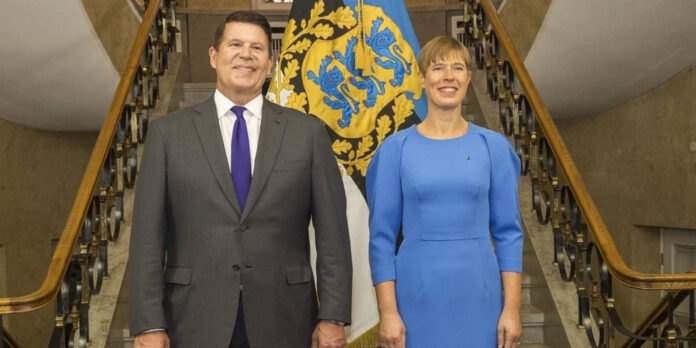
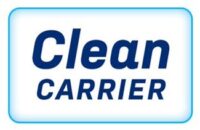 Clean Carrier: To ensure untrusted People’s Republic of China (PRC) carriers are not connected with telecommunications networks. Such companies pose a danger to national security and should not provide international telecommunications services to and from the United States.
Clean Carrier: To ensure untrusted People’s Republic of China (PRC) carriers are not connected with telecommunications networks. Such companies pose a danger to national security and should not provide international telecommunications services to and from the United States.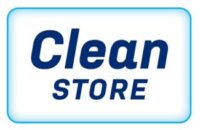 Clean Store: To remove untrusted applications from mobile app stores. PRC apps threaten privacy, proliferate viruses, and disinformation. Personal and business information must be protected from exploitation and theft for the CCP’s benefit. India has already banned 106 Chinese apps.
Clean Store: To remove untrusted applications from mobile app stores. PRC apps threaten privacy, proliferate viruses, and disinformation. Personal and business information must be protected from exploitation and theft for the CCP’s benefit. India has already banned 106 Chinese apps.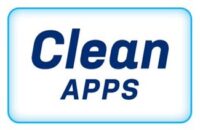 Clean Apps: To prevent untrusted PRC smartphone manufacturers from pre-installing or downloading trusted
Clean Apps: To prevent untrusted PRC smartphone manufacturers from pre-installing or downloading trusted 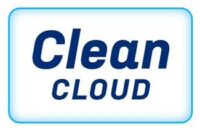 Clean Cloud: To prevent U.S. citizens’ most sensitive personal information and our businesses’ most valuable intellectual property from being stored and processed on cloud-based systems accessible to our foreign adversaries through companies such as Alibaba, Baidu, and Tencent.
Clean Cloud: To prevent U.S. citizens’ most sensitive personal information and our businesses’ most valuable intellectual property from being stored and processed on cloud-based systems accessible to our foreign adversaries through companies such as Alibaba, Baidu, and Tencent.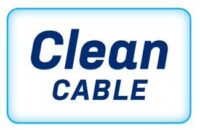 Clean Cable: To ensure the undersea cables connecting our country to the global internet are not subverted for intelligence gathering by the PRC at hyper scale. We will also work with foreign partners to ensure that undersea cables around the world aren’t similarly subject to compromise.
Clean Cable: To ensure the undersea cables connecting our country to the global internet are not subverted for intelligence gathering by the PRC at hyper scale. We will also work with foreign partners to ensure that undersea cables around the world aren’t similarly subject to compromise.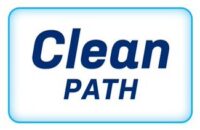 Clean Path: To secure data traveling on 5G networks into diplomatic facilities overseas and ensure it only passes through clean equipment from trusted providers. This protects against access by Chinese companies, which are obliged to hand over data and information to the state without any controls.
Clean Path: To secure data traveling on 5G networks into diplomatic facilities overseas and ensure it only passes through clean equipment from trusted providers. This protects against access by Chinese companies, which are obliged to hand over data and information to the state without any controls.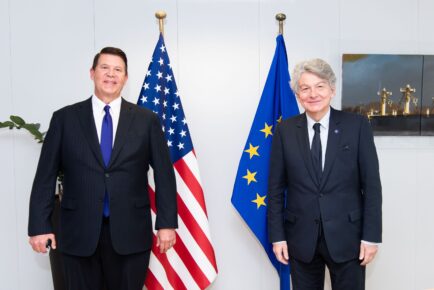
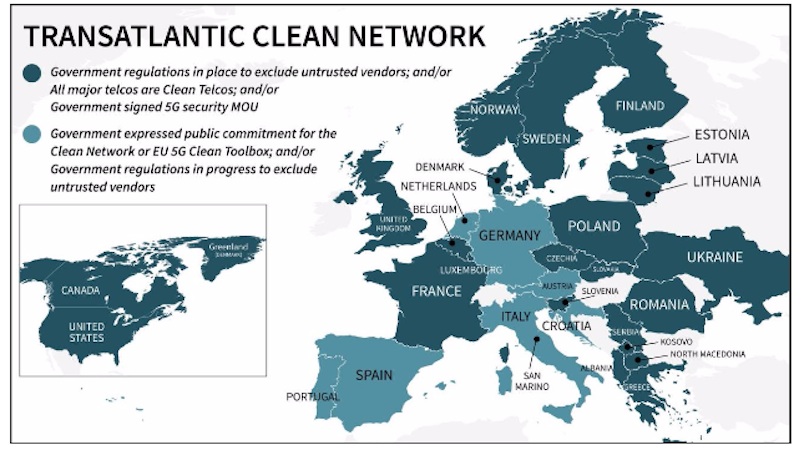
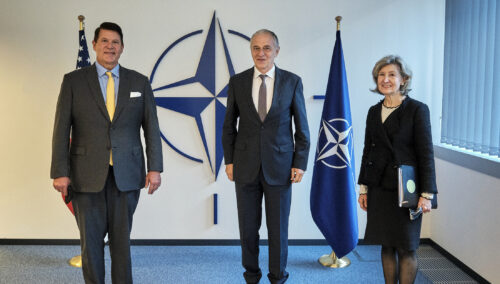
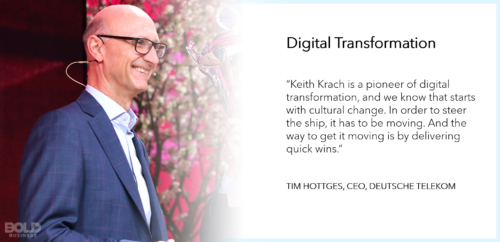 Krach says that during his 30 years as CEO in Silicon Valley,
Krach says that during his 30 years as CEO in Silicon Valley, 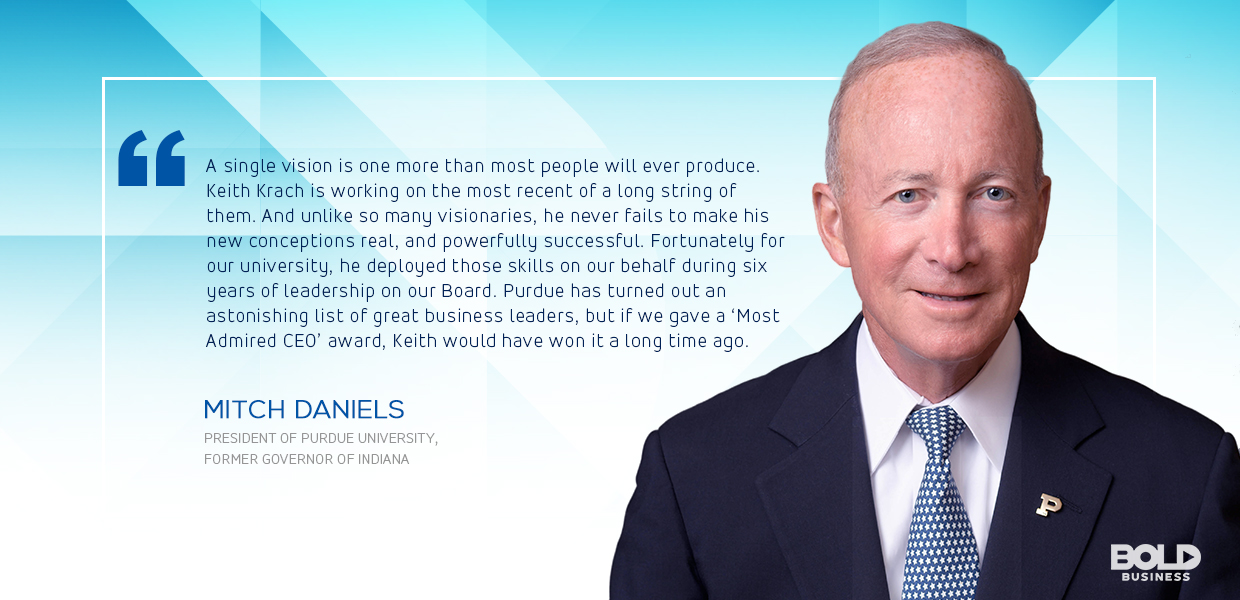 He replied, “Transformational leader” isn’t a title or a credential. It is an array of actions, traits and values aligned to make a positive difference in people’s lives. Transformational leaders are principled, visionary leaders who can dream big dreams, challenge the status quo, motivate and empower diverse teams to tackle difficult challenges that inspire a noble mission to reinvent the future that makes the planet a better place for everyone.”
He replied, “Transformational leader” isn’t a title or a credential. It is an array of actions, traits and values aligned to make a positive difference in people’s lives. Transformational leaders are principled, visionary leaders who can dream big dreams, challenge the status quo, motivate and empower diverse teams to tackle difficult challenges that inspire a noble mission to reinvent the future that makes the planet a better place for everyone.” 